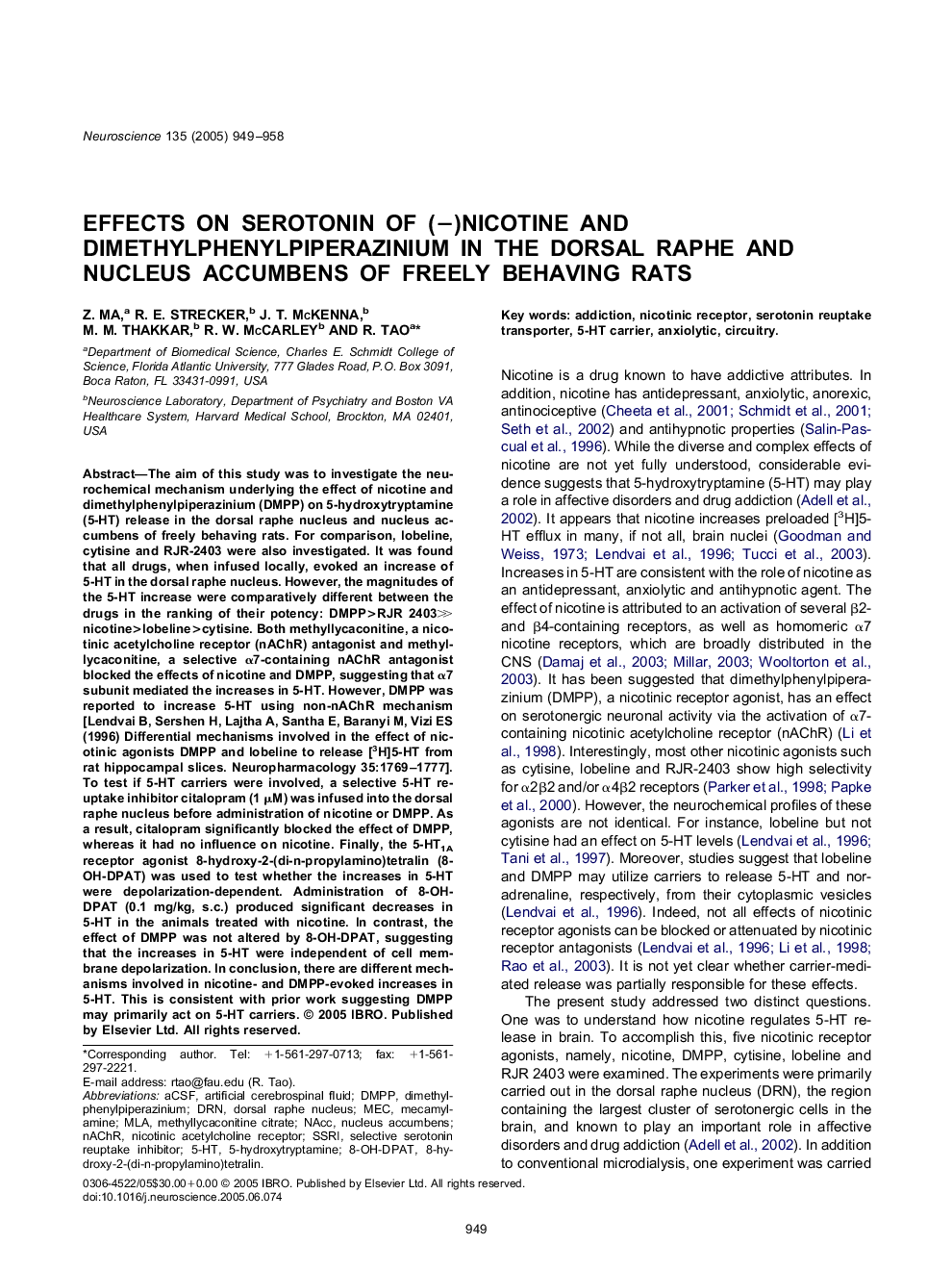| Article ID | Journal | Published Year | Pages | File Type |
|---|---|---|---|---|
| 9425686 | Neuroscience | 2005 | 10 Pages |
Abstract
The aim of this study was to investigate the neurochemical mechanism underlying the effect of nicotine and dimethylphenylpiperazinium (DMPP) on 5-hydroxytryptamine (5-HT) release in the dorsal raphe nucleus and nucleus accumbens of freely behaving rats. For comparison, lobeline, cytisine and RJR-2403 were also investigated. It was found that all drugs, when infused locally, evoked an increase of 5-HT in the dorsal raphe nucleus. However, the magnitudes of the 5-HT increase were comparatively different between the drugs in the ranking of their potency: DMPP>RJR 2403â«nicotine>lobeline>cytisine. Both methyllycaconitine, a nicotinic acetylcholine receptor (nAChR) antagonist and methyllycaconitine, a selective α7-containing nAChR antagonist blocked the effects of nicotine and DMPP, suggesting that α7 subunit mediated the increases in 5-HT. However, DMPP was reported to increase 5-HT using non-nAChR mechanism [Lendvai B, Sershen H, Lajtha A, Santha E, Baranyi M, Vizi ES (1996) Differential mechanisms involved in the effect of nicotinic agonists DMPP and lobeline to release [3H]5-HT from rat hippocampal slices. Neuropharmacology 35:1769-1777]. To test if 5-HT carriers were involved, a selective 5-HT reuptake inhibitor citalopram (1μM) was infused into the dorsal raphe nucleus before administration of nicotine or DMPP. As a result, citalopram significantly blocked the effect of DMPP, whereas it had no influence on nicotine. Finally, the 5-HT1A receptor agonist 8-hydroxy-2-(di-n-propylamino)tetralin (8-OH-DPAT) was used to test whether the increases in 5-HT were depolarization-dependent. Administration of 8-OH-DPAT (0.1mg/kg, s.c.) produced significant decreases in 5-HT in the animals treated with nicotine. In contrast, the effect of DMPP was not altered by 8-OH-DPAT, suggesting that the increases in 5-HT were independent of cell membrane depolarization. In conclusion, there are different mechanisms involved in nicotine- and DMPP-evoked increases in 5-HT. This is consistent with prior work suggesting DMPP may primarily act on 5-HT carriers.
Keywords
5-HTMECDMPP5-hydroxytryptaminenAChRDRNMLANAccaCSF8-OH-DPAT8-hydroxy-2-(di-n-propylamino)tetralinAddictionserotonin reuptake transporterAnxiolyticdimethylphenylpiperaziniumartificial cerebrospinal fluidmethyllycaconitine citrateCircuitrySelective serotonin reuptake inhibitorSSRIMecamylamineNucleus accumbensdorsal raphe nucleusnicotinic acetylcholine receptorNicotinic receptor
Related Topics
Life Sciences
Neuroscience
Neuroscience (General)
Authors
Z. Ma, R.E. Strecker, J.T. McKenna, M.M. Thakkar, R.W. McCarley, R. Tao,
